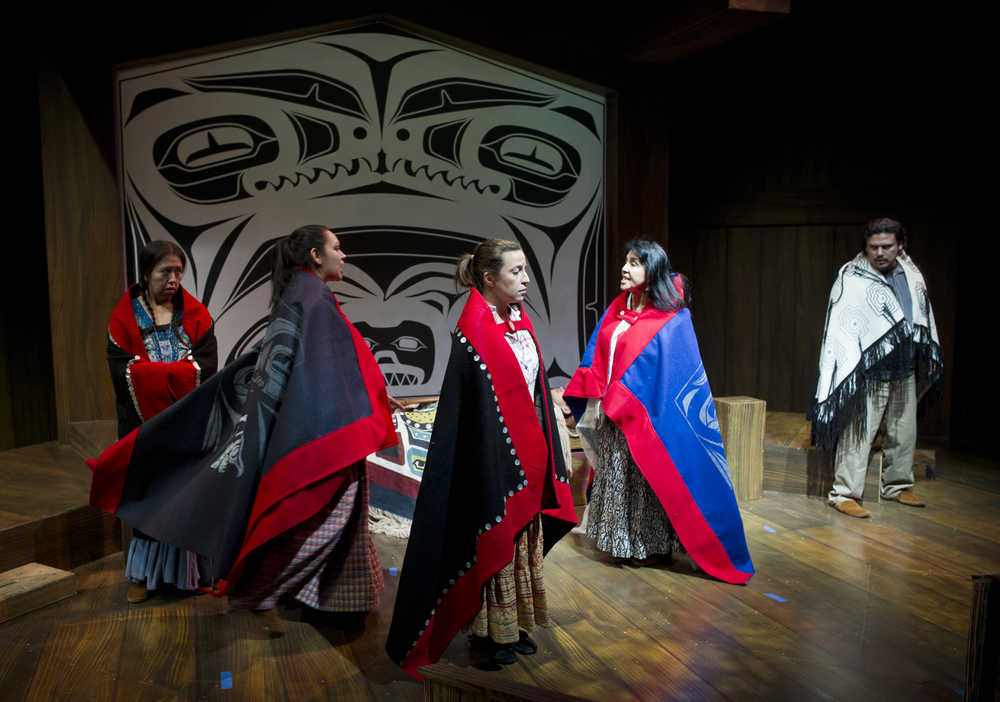I’ll admit it: my theater reviewing process usually involves reading other reviews (mostly so I can disagree with them; this tends to be an effective starting point).
And so “Our Voices Will Be Heard” by Vera Starbard—currently playing at Perseverance Theatre—presents a clear problem. It’s a world premiere; no other reviews exist (which would make mine a world premiere, too).
These days, you don’t often get to experience anything for the first time. Not to mention a professional production of a debut Alaska Native playwright Perseverance Theatre Artistic Director Art Rotch likens in the playbill to “a young Paula Vogel.” Oh, yeah—the play also features an entirely Alaska Native/Native American cast AND director. You get the idea. “Our Voices Will Be Heard” presents a rare opportunity on many different levels.
However, as far as world premieres go, I wouldn’t call the experience preconception-free. The playbill warns of “terribly difficult” subject matter involving sexual abuse. At the performance I attended the audience received this warning again verbally, right after it was asked to turn off its cell phones and refrain from flash photography. This led me to expect either graphic depictions of said abuse or some kind of live-action afterschool special (and maybe both).
Luckily, neither proved true.
Yes, part of the plot does involve a “terribly difficult” subject, but sexual abuse is never depicted on stage, let alone graphically; even when characters mention it they use purposefully vague terms.
And yes, “Our Voices Will Be Heard” does occasionally veer into melodrama. However, there’s a fine line between the dramatic and melodramatic that isn’t always clear to seasoned playwrights, let alone a first-timer. If Starbard occasionally strides across it, I, for one, am inclined to forgive her.
“Our Voices Will Be Heard” takes the form of a split, interspersed narrative: one storyline set at a Tlingit baby naming ceremony celebration in present-day Southeast Alaska, the other in a small Tlingit village at around the turn of the 20th century. Both stories unfold before a backdrop strongly evocative of a cedar clan house, courtesy of scenic designer Akiko Nishijima Rotch and Northwest Coast visual artist Rico Worl (of Trickster Company), whose specially commissioned formline wall panel—backlit and glowing throughout the play—definitely deserves its own mention.
The present-day section revolves around the character of the Storyteller, ably portrayed by Yup’ik storyteller and actor Jack Dalton, who keeps breaking away from the celebration to crack goodhearted jokes about Tlingit grandmothers (apparently they’re just as demanding and feisty as my own grandmother). More importantly, the Storyteller also tells us a story—actually, it’s more of a saga, told in pieces—about “Wolverine Woman,” and how she came to acquire her trademark courage, strength and skill, before passing those traits on to all future wolverine generations.
Through allegory, the story of “Wolverine Woman” echoes the forward narrative of the historical section, which also opens at a Tlingit baby naming ceremony for two cousins—a boy, Sagu and a girl, Kutaan—from a prominent village family.
When we next see the cousins, they’ve grown into early adolescence. As the family prepares for yet another village celebration—a wedding this time—we learn there’s something odd about Kutaan’s behavior of late. She’s secretive, recoils from familial affection and, much to her mother’s consternation, doesn’t talk with boys the way the other village girls do. Instead, she seems to prefer the company of rough-hewn white traders, a new and increasing presence in the area.
I’m sure you can see where this is heading. In order to preserve that new play-experience, I won’t divulge who did what to whom, or how each character reacts to these revelations. But I will say the discovery proves a major turning point for the family, who each must decide how to deal with the aftermath.
The strength of “Our Voices Will Be Heard” lies in the “gestalt” of its production, achieved by the total effect of the writing, acting, direction, costuming, set design and a score/soundscape by percussionist and Native Jazz Quartet member Ed Littlefield. You get the sense that everyone involved really cherished his or her involvement—definitely not the case with all artistic collaborations.
Under the crisp direction of Larissa FastHorse, of the Sicangu Lakota Nation, the entire Juneau cast shines, including Tlingit actors Erin Tripp as Kutaan, Xoodzi as Sagu, Leetta Gray as Sagu’s mother Wanadoo and Frank Henry Kaash Katasse as Uncle Jinahaa; Yup’ik storyteller and actor Jack Dalton as the Storyteller; Iroquois actor Erika Stone as Kutaan’s mother Litaa; Aleut actress Jane Lind as family matriarch Shanaa; Cherokee actor Robert Vestal as Sagu’s father and clan leader Ta.
Now, I can honestly say “Our Voices Will Be Heard” is the first Tlingit theater piece I’ve ever seen, as well as the first play with an all-Native cast and creative team. But it certainly won’t be the last. Perseverance plans to include another world premiere by a debut Tlingit playwright in next year’s season.
Don’t get me wrong. I encourage you to enjoy “Our Voices Will Be Heard” on its own artistic merits—I found specifically intriguing its overarching questions about culture, particularly surrounding how it evolves in response to both internal and external pressures.
However, it’s also nice to see a traditionally underrepresented group make some headway. Just saying.
Geoff Kirsch writes from Juneau. Read more at www.geoffkirsch.com.

